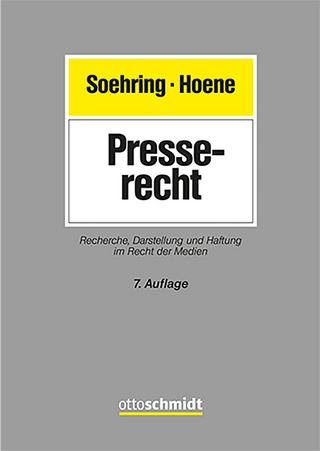
Muting Israeli Democracy
How Media and Cultural Policy Undermine Free Expression
Seiten
2009
University of Illinois Press (Verlag)
978-0-252-03458-9 (ISBN)
University of Illinois Press (Verlag)
978-0-252-03458-9 (ISBN)
- Titel ist leider vergriffen;
keine Neuauflage - Artikel merken
Based on the result of years of critical analysis of Israeli media law, this book argues that the laws governing Israeli electronic media are structured to limit the boundaries of public discourse. It posits the theory of a 'mute democracy', one in which the media are designed to provide a platform for some voices to be heard over others.
The result of years of critical analysis of Israeli media law, this book argues that the laws governing Israeli electronic media are structured to limit the boundaries of public discourse. Amit M. Schejter posits the theory of a "mute democracy," one in which the media are designed to provide a platform for some voices to be heard over others. While Israel's institutions may be democratic, and while the effect of these policies may be limited, this book contends that free speech in Israel is institutionally muted to ensure the continued domination of the Jewish majority and its preferred interpretation of what Israel means as a Jewish-democratic state. Analyzing a wide range of legal documents recorded in Israel from 1961 to 2007, Muting Israeli Democracy demonstrates in scrupulous detail how law and policy are used to promote the hegemonic national culture through the constraints and obligations set on electronic media.
The result of years of critical analysis of Israeli media law, this book argues that the laws governing Israeli electronic media are structured to limit the boundaries of public discourse. Amit M. Schejter posits the theory of a "mute democracy," one in which the media are designed to provide a platform for some voices to be heard over others. While Israel's institutions may be democratic, and while the effect of these policies may be limited, this book contends that free speech in Israel is institutionally muted to ensure the continued domination of the Jewish majority and its preferred interpretation of what Israel means as a Jewish-democratic state. Analyzing a wide range of legal documents recorded in Israel from 1961 to 2007, Muting Israeli Democracy demonstrates in scrupulous detail how law and policy are used to promote the hegemonic national culture through the constraints and obligations set on electronic media.
Amit M. Schejter is an assistant professor of communications and co-director of the Institute for Information Policy at Penn Sate University and a former attorney specializing in Israeli telecommunication and media law, policy, and regulation.
Introduction: The Makings of a Mute Democracy; Chapter 1: Culture and Israeli Culture -Features and Institutions; Chapter 2: Israel-Media Space and Political Culture; Chapter 3: Israeli Electronic Media as a System of Control; Chapter 4
| Reihe/Serie | The History of Communication |
|---|---|
| Zusatzinfo | 3 line drawings; 7 tables |
| Verlagsort | Baltimore |
| Sprache | englisch |
| Maße | 152 x 229 mm |
| Themenwelt | Recht / Steuern ► EU / Internationales Recht |
| Recht / Steuern ► Privatrecht / Bürgerliches Recht ► Medienrecht | |
| Sozialwissenschaften ► Kommunikation / Medien ► Medienwissenschaft | |
| Sozialwissenschaften ► Politik / Verwaltung | |
| ISBN-10 | 0-252-03458-9 / 0252034589 |
| ISBN-13 | 978-0-252-03458-9 / 9780252034589 |
| Zustand | Neuware |
| Haben Sie eine Frage zum Produkt? |
Mehr entdecken
aus dem Bereich
aus dem Bereich
Recherche, Darstellung und Haftung im Recht der Medien
Buch | Hardcover (2024)
Verlag Dr. Otto Schmidt KG
CHF 179,95
Lehrbuch des gesamten Medienrechts unter besonderer Berücksichtigung …
Buch | Softcover (2023)
UTB (Verlag)
CHF 30,80


